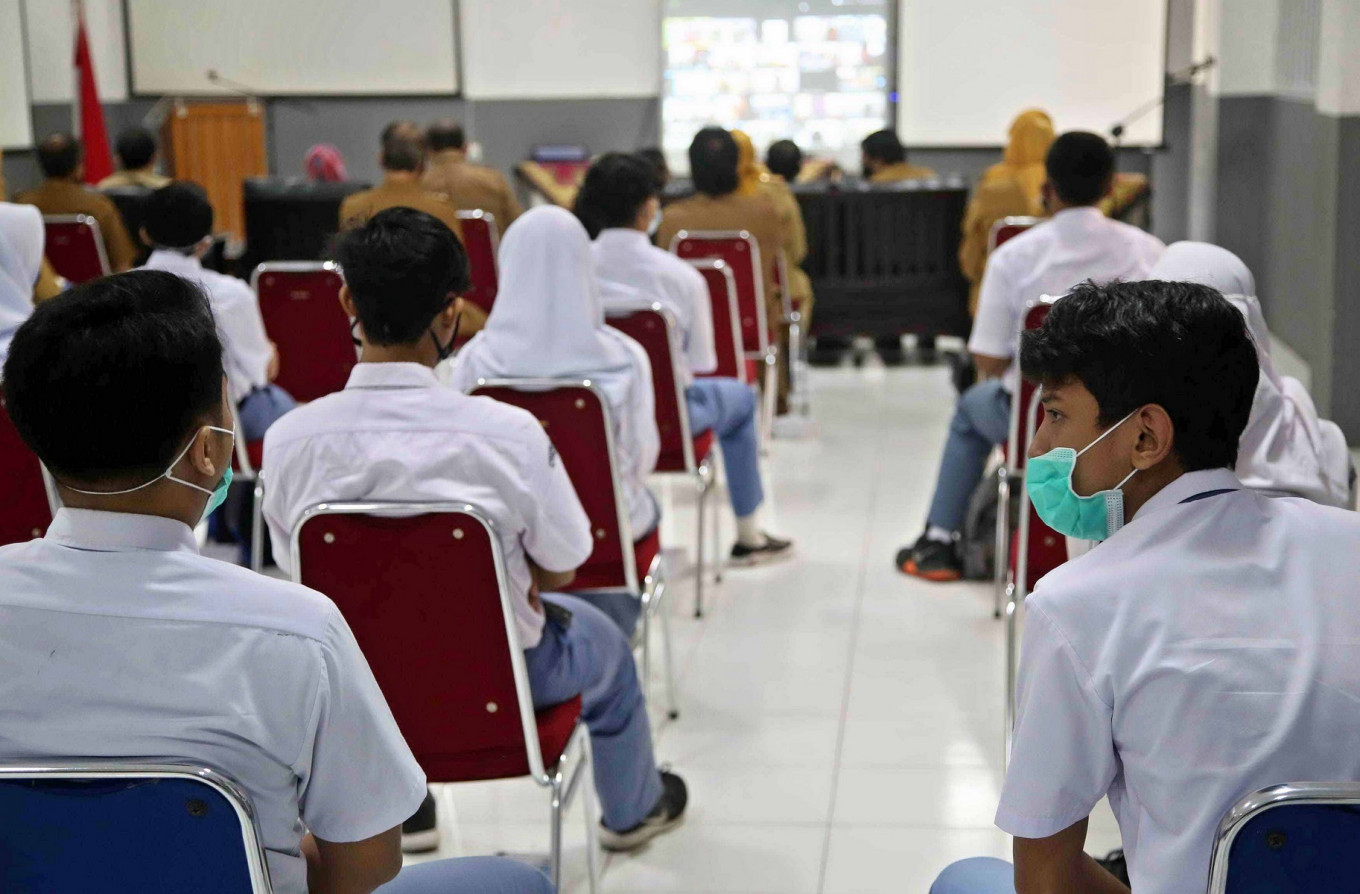Popular Reads
Top Results
Can't find what you're looking for?
View all search resultsPopular Reads
Top Results
Can't find what you're looking for?
View all search resultsRI education spending fails to yield good results: Report
Change text size
Gift Premium Articles
to Anyone
A
lthough Indonesia's education system has grown more decentralized, not all local administrations have allocated their education budgets as required, with much of their spending going to teacher salaries instead of learning programs, a new report released Wednesday has found.
A World Bank report, titled Revealing How Indonesia’s Subnational Governments Spend Their Money on Education, found that 112 of the country's 508 cities and regencies did not allocate 20 percent of their budget on education in 2018. This was also the case with 12 out of the 34 provinces in the country.
"Local administrations have varying capacities in allocating and executing budgets," said World Bank economist Rythia Afkar, who was among those who worked on the report, during the launch of the document on Wednesday.
She said that during the planning stage, most local administrations tended to prioritize quantity, such as the number of existing teachers, rather than the quality, such as the number of competent teachers.
Around 60 percent of the national education budget, which accounts for 20 percent of the state budget as mandated by the Constitution, is distributed to local administrations nationwide.
In 2020, the government allocated Rp 508 trillion (US$35.9 billion) on education, Rp 306 trillion of which was transferred to local administrations. The 2021 state budget, meanwhile, earmarks Rp 550 trillion for education.
Of the 388 cities and regencies that fulfilled their duty to allocate 20 percent of their budget on education, 118 of them did not actually spend the entirety of their allocated funds, the report said.
The report, which looked into data from the Education and Culture Ministry and the Finance Ministry, showed that local administrations on average spent 75 percent of their total education budget on teacher salaries. In some extreme cases, 32 cities and regencies spent more than 90 percent of their budget on salaries.
It also found that in 27 cities and regencies surveyed by World Bank researchers, actual non-salary spending comprised only about 14 percent of the total education budget, which was mostly spent on civil servant teachers, with a smaller portion on contract teachers. These 27 cities and regencies on average spent 34 percent of non-salary spending on infrastructure, 30 percent on learning support activities such as grants and scholarships, 22 percent on operational costs and only 8 percent on teacher training.
“This limits the resources to run non-salary programs, such as supporting programs for school operational assistance funds, scholarships and teacher training,” Rythia said.
“This needs to be reviewed. Why? Because we see that non-salary spending has a positive correlation with student learning outcomes.”
Rythia said that while the ideal portion for salary and non-salary spending depended on each region's needs, foreign countries performing better education-wise did not spare as much of their budget on salaries as Indonesia did. The central government and local administrations in Indonesia needed to spend more efficiently, she said.
The report said that high-performing education systems tended to spend a much higher proportion of their education budget on non-salary spending. It cited 2017 data from the UNESCO Institute for Statistics that showed Indonesia spending a higher proportion of its budget on teacher salaries than Finland, Norway, the Netherlands, as well as neighboring countries Vietnam and Malaysia – ranging between 40 and 60 percent.
The report recommended that the education ministry guide local administrations in prioritizing spending on a smaller number of programs that were effective in raising student learning outcomes. The researchers also urged the ministry, alongside the Finance Ministry, to identify regions' financial and technical limits in delivering education services and provide tailored assistance based on these assessments.
Education and Culture Minister Nadiem Makarim, though not directly addressing budget concerns, said during the report’s launch that he would take into account the report findings and recommendations. Nadiem said teacher training must undergo a “total reform” as the quality of teachers was important.
“They can’t just be gathered at seminars in hotels and be expected to become good teachers once they return to schools. Their skills and competence must be trained in their own arena; in a school environment [...] with real students,” he said.
Indonesian Teachers Association (PGRI) chairperson Unifah Rosyidi highlighted concerns surrounding teacher training, saying that “in the processes of [teacher] assessment, recruitment and deployment, there's almost no talk about continuing professional development”.
Another 2020 World Bank report found that none of the surveyed grade 4 teachers at either public or private primary schools supervised by the education ministry met the minimum score for knowledge of at least 80 in Indonesian language, mathematics and pedagogy.
With much of the education budget spent on teachers' salaries, ensuring their competency has become a point of concern. This was because much improvement in student learning outcomes has yet to be observed despite the gradual increase in the education budget and access to education.
The 2018 Program for International Student Assessment (PISA) report showed that only about one-third of Indonesian students attained the minimum level of proficiency in reading, mathematics and science.
Finance Ministry director general for fiscal balance Astera Primanto Bhakti told The Jakarta Post that his ministry had been monitoring regions' mandatory spending on education, acknowledging that some regions had yet to allocate 20 percent of their local budget on education spending.
To push local administrations into complying with the mandatory budget allocation, the ministry would delay the transfer of the state budget to regions under the general allocation fund (DAU) scheme.










